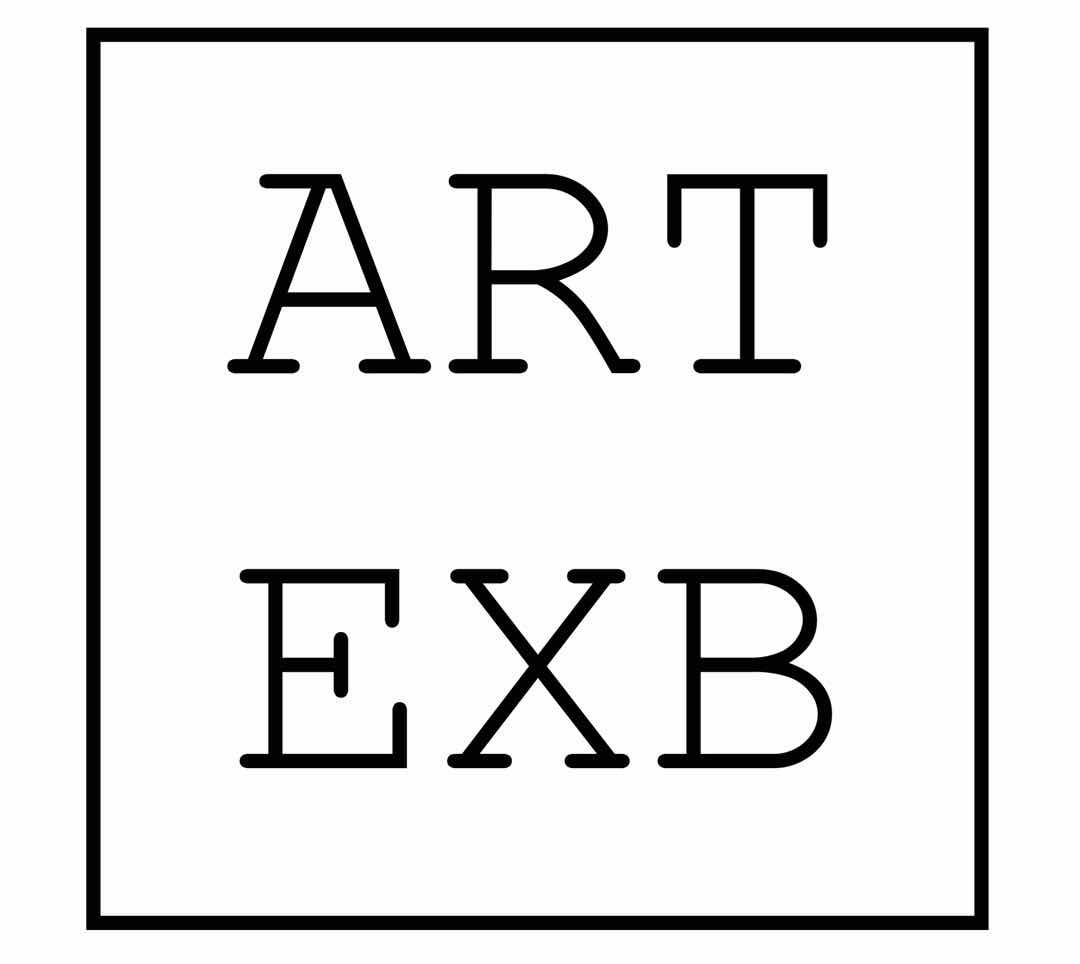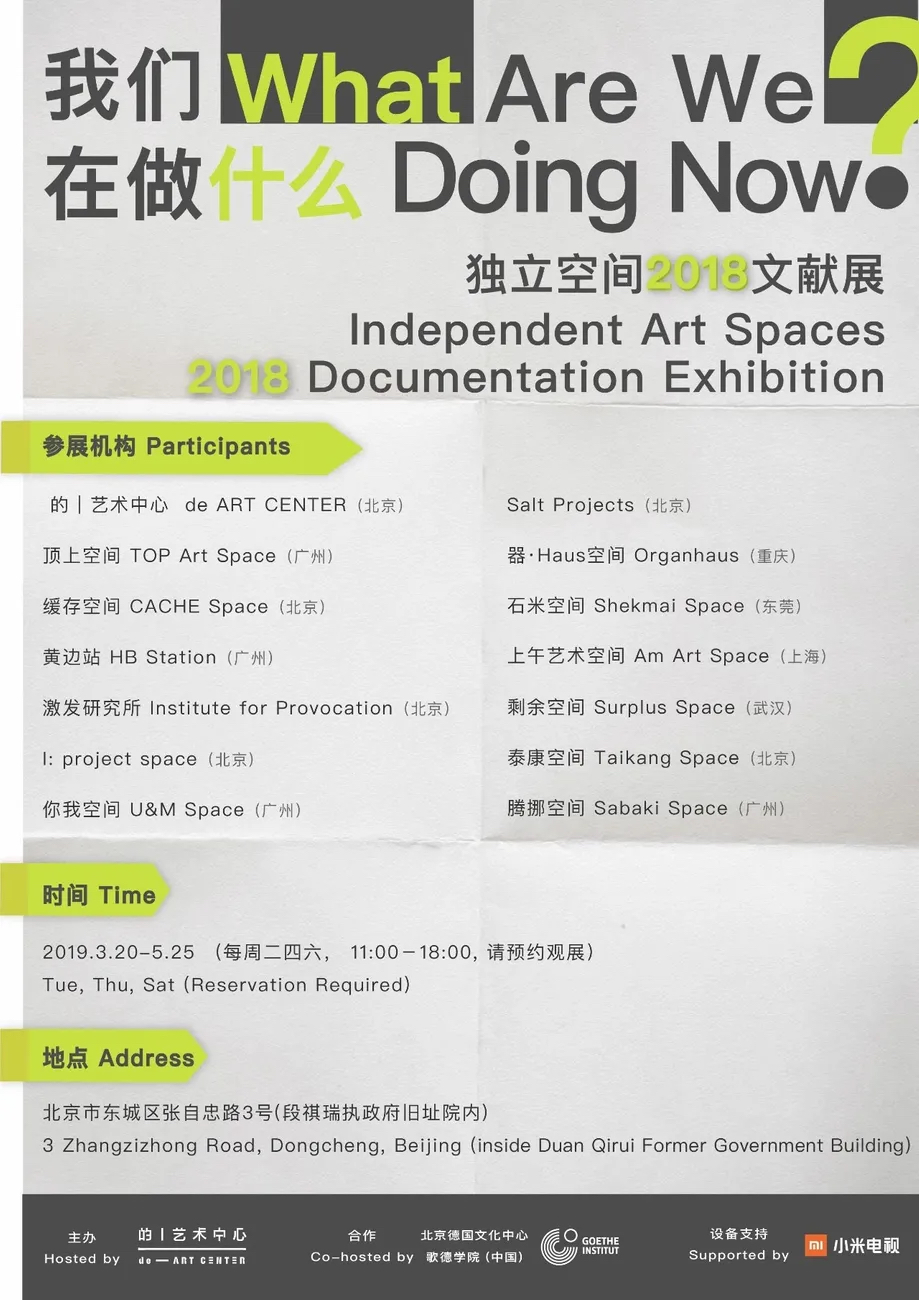通过展览,进入讨论,是我们空间一直坚持的事。这次活动也不例外,它分为展览和讨论两个部分。在开幕后的3月21日和22日,我们将就相关议题邀请各个空间的负责人进行专题讨论,分别在 的|艺术中心 和歌德学院(中国)进行。之后在展览期间的四五月份,我们也会邀请与独立空间相关的赞助人(机构)、志愿者、策展人、艺术家、媒体从业者以及曾经(已关闭的空间)的运营者等,从他们的角度和立场来客观审视独立空间在中国的存在。
What are We Doing Now—Independent Space 2018 Documentation Exhibition is hosted by de Art Center in cooperation with Goethe-Institut, and invites a total of 14 independent spaces from Beijing, Shanghai, Guangzhou, Dongguan, Chongqing, Wuhan in China to discuss the current situations and related issues of non-profit independent spaces in today’s China through presenting the activity document of each space in the past year. The event is organized and planned by Xia Yanguo, director of de Art Center, and assisted by Jiao Anqi. The exhibition period is from 20th March to 25th May, 2019.
Independent space is a unique existence in China.
In the current complicated social environment, the independent space in China is facing more and more diversified challenges. On one hand, it is “flourishing”; on the other hand, it is facing a free-fall fate. The value and significance it brought for the whole artistic ecology are never discussed carefully, like Chinese contemporary art itself, a lot of concepts are only mentioned and used simply in an opaque context, while the urgency of survival itself eliminates the possibility of having deeper or more public thinking on them to a certain extent.
Looking back on the past, its history is very short; compared to the large scale of contemporary art in China, its amount can be negligible, but why would many people like to dedicate to such “non-profit” career? It’s interesting to think about this question, and one of our original intentions to plan this project is also to make the public focus on such question. No matter whether the answer you hear is definite or not, it reflects the structural demand of it in this age.
The most basic desire during the planning of this project is to promote the communication between the independent spaces in China. Each space has its own emphasis and thinking: the purposes and appeals of the founders, the thinking of the operators on the content planning and operating management in the process, the difficulties faced by the spaces and their interactions with the outside world, etc. The communication barrier in the contemporary art world is not only the problem of art, it’s practical and urgent. Are we building any kind of threshold while producing knowledge? Are we falling into a pit of our own digging while criticizing the rigidity of the social system? If art makes life difficult, art knowledge makes audiences confused, and engaging in art makes the relationships between people more rigid, then we probably need to think our relationship with art and the outside world again.
In addition, whether the “art production” is excessive is also the problem we often meet in the exhibition planning. Works of art and exhibitions, like the technological products today, have entered into a hunger for unceasing “innovations”. New technologies make life easier, and they also make the behaviors of people more mechanized. It seems that new exhibitions open every day in China alone, but fewer of them can enter into serious discussion. Even if discussed by public media and we-media, they will be forgotten quickly into flat virtual files, like the contents in the “collection” function of WeChat, and will seldom be clicked. Efficient production is proportional to more waste, and it’s certainly difficult to present the literature of independent space in 2018 comprehensively. By looking back at the recent “history”, we also want to discuss whether our time and knowledge are in a state of being wasted. If there is something worth looking back at, what should we remember? Therefore, in the presentation of projects in the future, we also hope that de Art Center can share what is worth discussing with other counterparts at home and abroad so as to reduce waste and slow down the “production” to some extent.
What our space has always insisted on is to have discussions through exhibitions. This event is no exception, it is divided into two parts: exhibition and discussion. After the opening, we’ll invite the leader of each space to have seminars on related topics respectively at de Art Center and Goethe-Institut (China) on March 21 and 22. We’ll also invite sponsors (agencies), volunteers, curators, artists, media practitioners and ex-operators of independent spaces (that have been closed) to objectively review the existence of independent spaces in China from their perspectives in April and May during the exhibition period.

